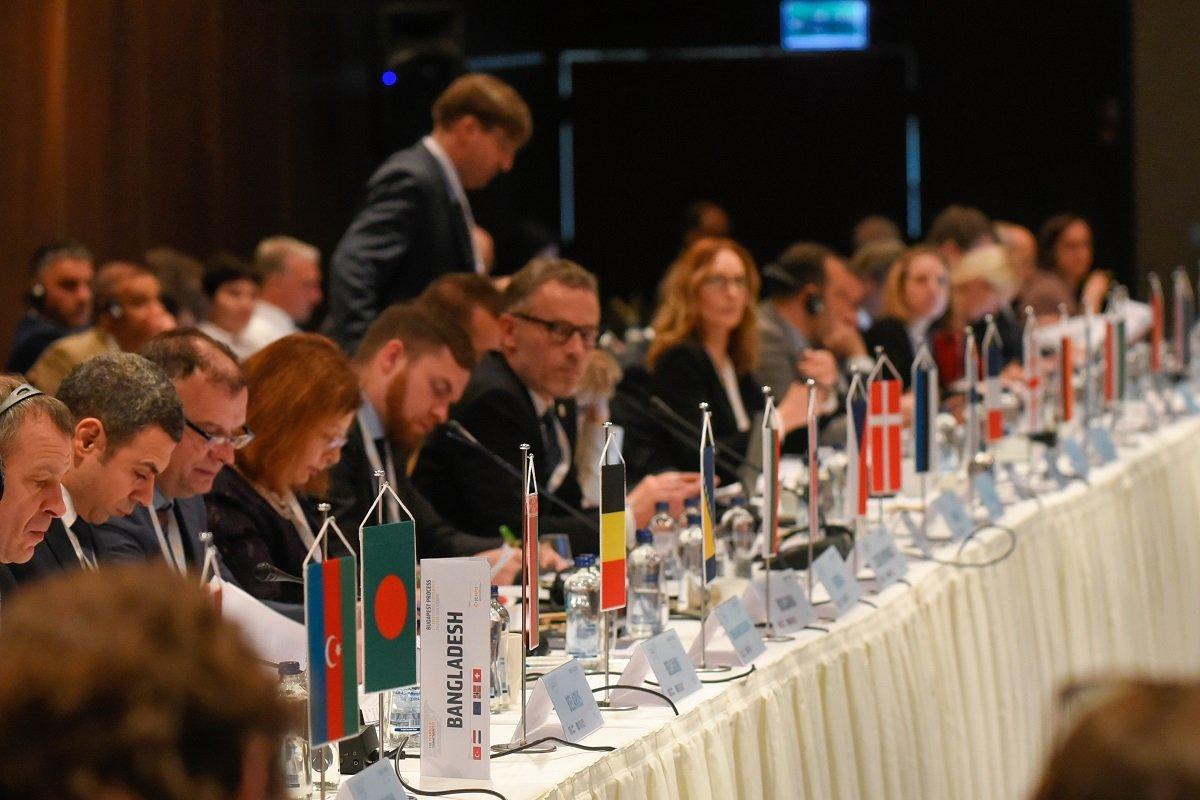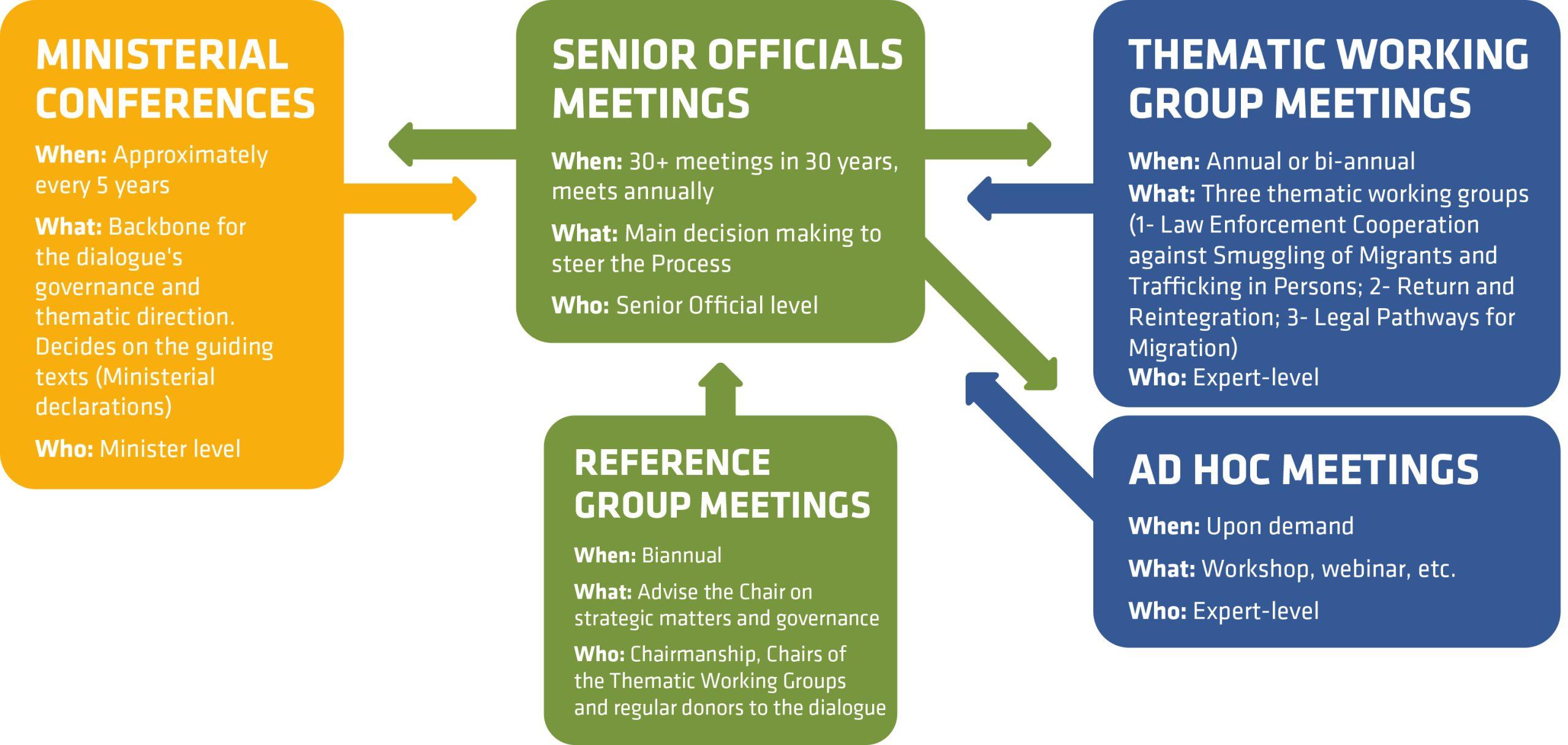The Budapest Process is traditionally structured around four types of meetings: Senior Officials Meetings are the backbone of the dialogue and complemented by Reference Group Meetings where limited participating states support the strategic direction of the dialogue. Thematic Working Group meetings take place several times a year and offer more specific opportunities for cooperation on key thematic areas. Finally, Ministerial Conferences happen once every five years on average and provide the process the political anchoring and direction it needs.
Senior Official Meetings
Senior Official Meetings (SOMs) take place annually and gather senior officials from all participating states and organisations. As the main decision-making body of the dialogue, SOMs discuss ongoing developments, determine the main policy directions and governance of the Budapest Process and links the dialogue to global processes.
Senior Official Meetings also take place in preparation for upcoming Ministerial Conferences. After more than 30 Senior Officials Meetings in the last 30 years, the Budapest Process continues to use these meetings as a wider platform to share and help strategically guide the dialogue and its upcoming meetings and activities.
Reference Group meetings
Reference Group Meetings allow for a smaller group of Senior Officials to meet. Its objectives are two-fold; firstly, build upon and follow-up on the conclusions and recommendations reached in the Thematic Working Group meetings. Thus, the Reference Group, runs as red thread between meetings and opportunities for deepened engagement for the dialogue, whereby capacity-building initiatives, development of guidelines or standards in a specific area, new activities and projects, further research and subsequent publications as well as webinars are set-up.
In addition, the Reference Group provides strategic guidance to the BP Chairmanship and has been tasked with supporting the development of the Ministerial Documents to be adopted in the 7th Ministerial Conference.
Thematic Working Group Meetings
The Budapest Process Thematic Working Groups gather expert officials from national administrations from all BP participating and observer states, to examine, discuss and share information and best practices on matters dealing with concrete migration challenges.
The Thematic Working Groups are established as a result of expressed interest from participating states and reflect the main topics discussed in the Process. The following working group structure was adopted in 2022, replacing the previous Regional Working Group established in 2010.
Thematic Working Group 1: Thematic Working Group on Law Enforcement Cooperation
Co-chaired by Bulgaria and Iraq
This Working Group is complemented by the “Community of Law Enforcement Practitioners – COLEP”, its operational arm. The COLEP platform serves as a catalyst for bilateral and multilateral initiatives on operational cooperation among law enforcement agencies and includes selected BP countries.
Thematic Working Group 2: Thematic Working Group on Return and Reintegration
Co-chaired by Bangladesh and Türkiye
This Working Group has developed a Roadmap on Return and Reintegration for the Budapest Process to meaningfully support Bangladesh, Iraq and Pakistan – with inclusive, rights-based and sustainable return and reintegration. The Roadmap will guide future actions within and through the Budapest Process and the projects under its umbrella.
Thematic Working Group 3: Thematic Working Group on Legal Pathways for Migration
Co-chaired by Italy and Pakistan
This Working Group focuses on several aspects of legal pathways for migration, including on labour migration, student mobility, and skills partnerships (skills-making, reskilling, recognition of prior learning, etc.). A Budapest Process publication on TVET structures in selected Silk Routes and EU countries has provided strong knowledge base for further action-oriented recommendations and initiatives to be taken forward in this working group.
Ministerial Conferences
Ministerial Conferences happen on average every five years and lead to the adoption of a Ministerial Declaration by dialogue partners. This Declaration shapes the next season of the dialogue, which usually last five years. Since 2019, Ministerial Declarations are complemented by an Action Plan which set out clear action points to follow up on the implementation of key priorities for dialogue partners.


